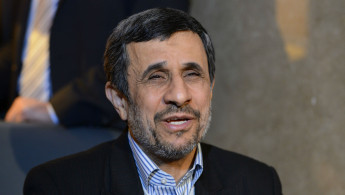Iran's former hard-line President Mahmoud Ahmadinejad calls for immediate 'free' elections
The call made by Ahmadinejad - known for the bloody repression of mass protests against his controversial 2009 re-election - signals growing desperation against a rapidly declining popularity.
Ahmadinejad was markedly silent on the wave of protests that swept Iran early in the year.
Thousands of Iranians took to the streets in anti-government rallies in January, in what is thought to be the biggest show of public defiance since 2009.
The protests came a day after demonstrations against rising food prices and inflation began in second city Mashhad, with authorities arresting 52 protesters over the unrest.
While the protests were initially centred around rising living costs, they quickly became focused against the regime in general with chants of "death to the dictator".
In an attempt to shut down protests and manage the unrest, Iran's government blocked access to the encrypted Telegram messaging app and the photo-sharing app Instagram, which now join Facebook and Twitter in being banned.
"The immediate holding of free presidential and parliamentary elections - of course without their being engineered by the Guardian Council and without interference by military or security bodies so that people have a free choice - is an urgent necessity," he wrote.
The guardian council is a powerful vetting body overseeing all elections in Iran. Ahmadinejad, among others, was barred by them last May from running for president.
The council rejected Ahmadinejad's call for early elections, slamming his criticism of its supervisory procedures.
Ali Kadkhodai, the council's spokesperson, said, "the country has no need for elections right now because all elections are conducted in a legal and sustainable manner".
Parliamentary elections are not due before 2020, and presidential elections 2021.
Kadkhodai added that Ahmadinejad himself tried to get around the rules in the 2009 election by pressuring them to publish the results ahead of the legal time frame.
In his letter, Ahmadinejad referred directly to a speech delivered on Sunday by Khamenei who called for progress in the "field of justice".
"These clear comments from the leader can of course be understood" as an appeal for "urgent and concrete reforms that meet the demands of the people," Ahmadinejad added.
He also called for the dismissal of Ayatollah Sadeq Larijani, the judiciary chief and rival claiming that "one of the main causes of public discontent" was the injustice of the judiciary.
All people arrested for criticising the regime should be released added the former president, and proceedings against them halted.
Last month, an Iranian opposition figure under house arrest voiced rare criticism of the supreme leader, blaming him for the "disastrous results" of the Revolutionary Guard's vast political and economic influence.
Under Iran's political system, Khamenei is considered the representative of God on earth, with the final say on all major policies. Iranians can go to jail for publicly criticising him.





 Follow the Middle East's top stories in English at The New Arab on Google News
Follow the Middle East's top stories in English at The New Arab on Google News
![Israeli forces ordered bombed Gaza's Jabalia, ordering residents to leave [Getty]](/sites/default/files/styles/image_330x185/public/2176418030.jpeg?h=a5f2f23a&itok=_YGZaP1z)

